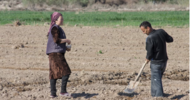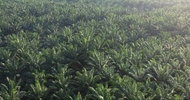Hedge funds and bankers are buying everything from farmland to mines across the Global South. Mark L Thomas looks at how speculators here fuel exploitation half a world away
- Socialist Worker
-
27 July 2010
As the world's available farming land shrinks in the face of population growth, climate change and soil degradation, Australia's vast tracts of land are going to be increasingly important for global food security. Is the sell-off in Australia's long term interests?
Foreign interests including state-owned companies from China and the Middle East are increasingly looking to Australia to secure their food production by purchasing key agricultural assets.
Africa's untapped agriculture potential make it an ideal partner for resource-constrained Middle Eastern countries that seek to improve their food security, a new report from Standard Chartered Bank said.
- Trade Arabia
-
22 July 2010
Indian floriculture companies are moving into other agri-products in the world's second-largest continent.
- Business Today
-
21 July 2010
Growing world food insecurity is ushering in a new geopolitics of food scarcity, one where competition for land and water is crossing national boundaries.
Jagjit Singh Hara, a farmer in Jalandhar, has been getting offers from Congo, Namibia and Nigeria to take land on lease and start cultivation.
- Financial Express
-
12 July 2010
A group of farmers from Punjab are planning to take 1 lakh hectare land on lease in the African nation of Ethiopia for cultivation.
- Sikh Sangat News
-
11 July 2010
In the last few months, the process seems to be speeding up with more and more Indian farmers checking out investments in Africa.
- Indian Express
-
11 July 2010
Anywaa Survival Organisation's critique of the Ethiopian government's video presentation of rice land grab in the Gambela region.
If you are a small farmer in a developing country, and there is a big agricultural land investment deal going down in your neighbourhood, you could become part of it and make money in several ways, said a new UN-backed study.
"We support continued efforts to develop principles for investment in the agricultural sector undertaken by the World Bank, regional development banks, FAO, UNCTAD, and IFAD," say G8 heads of state.
- Canadian Press
-
26 June 2010
The Addis government shows scant regard for the potential local impact of massive Indian investment in floriculture and biofuels.
- Asia-Africa Confidential
-
25 June 2010
Evidence suggests a marked disparity in the benefits received by those involved in and affected by these transnational land acquisitions, particularly for those originally dwelling on the land.
- Brookings Institution
-
25 June 2010
Indian tea companies, among others, are making a beeline to acquire estates in Africa. And the government is facilitating their hunt for good deals.
- Economic Times
-
13 June 2010
"Land grabbing" will be featured on the agenda of a high-level conference on the rice industry in November 2010 in Vietnam, where 17 agricultural ministers will be in attendance.
- Malaya Business Insight
-
13 June 2010
TADCO subsidiary has already arranged leases in Cambodia, Vietnam, Pakistan and the Philippines for export production of aromatic and long grain basmati rice.
- Financial Times
-
13 June 2010
Gulf countries investing in farmland abroad have a real opportunity to help developing countries and should rethink simply switching their investments to richer states says Dr Mahendra Shah
An economic analysis of land grabbing in 25 countries by a French securities firm. Predicts the entry of Danone, Nestlé and Unilever into the fray.
- ODDO Securities
-
30 May 2010
NCB Capital estimates that Saudi Arabia and the United Arab Emirates, the main buyers of African land, have acquired some 6 million acres worldwide, largely in Sudan, Pakistan and Indonesia. Other estimates are much higher.
Amid much talk about the need for "codes of conduct" to help regulate this new phenomenon, I found myself wondering whether Cecil Rhodes would have signed such a code. He probably would, and have then gone on to completely disregard it.
- Mokoro Newsletter
-
27 May 2010
South Africa, which became a net importer of food two years ago after two decades of net exporting, is developing African agricultural ambitions of its own.
- Business Report
-
25 May 2010
Most people involved in land rights issues are likely to agree that the most abusive companies (and governments) should be vigorously prosecuted using national, regional and global legal fora.
- Terra Nullius
-
23 May 2010
Participants agreed on the importance of an open and inclusive dialogue to continue encouraging responsible agricultural investment by various parties.
- US, Japan, AU
-
19 May 2010
The process of buying up large swathes of farmland in foreign countries is politically sensitive, but "beggars can't be choosers" says a senior executive at a leading Middle Eastern food commodities trading firm
Rural people in several parts of Cameroon are protesting a government policy that allows the government to sell or lease vast parcels of arable land to foreign investors.
When will governments recognise the immense potential of their own farmers and their sustainable, diverse family farming systems, that are so desperately in need of genuine 'responsible' agricultural investment to assure food and seed sovereignty, asks Joan Baxter
The long-term danger I foresee, in the worst case scenario, is that the debt spiral will eventually converge with the land grabs.
Capital flows into Africa, include farmland acquisitions by foreign investors, rose 16 percent in 2008 to a record $62 billion even as FDI that year fell 20 percent worldwide
Question - via video - to the 2010 World Economic Forum on Africa in Dar es Salaam on land grabbing in Ethiopia















